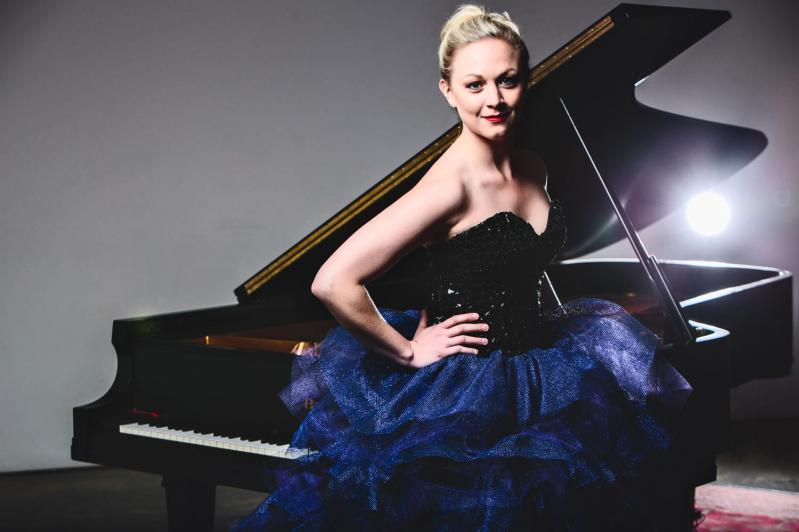For the Rising Stars Piano Series on Saturday, Kara Huber, a Canadian-American concert artist, performed a program confirming her international renown for a flair for contemporary music. The mostly American program was in some ways a bit lighter than the typical piano recital, but no less substantial.
Liliane Questel, the founding director of the series, which takes place at the Southampton Cultural Center, said at the beginning of the concert that they wanted “a program that would make anybody happy,” and that certainly proved to be an understatement.
Ms. Huber, a Grammy-nominated pianist who began lessons at the age of 5 and is now a doctoral candidate at the University of Cincinnati College-Conservatory of Music, has appeared at Weill Recital Hall, the Kennedy Center, and the Smithsonian American Art Museum, as well as across North America, Europe, and Australia, and is an alumna of Southampton’s summer Pianofest.
The program began with the Three Preludes by Gershwin, first performed by the composer in 1926. Each one is a short, quintessential gem of Gershwin’s unmistakable style. After the first one, less than two minutes in length, there were oohs and ahs from the audience, and, although it’s not customary at that point, there were some who couldn’t resist applauding. Such was the relaxed, joyful tone of the evening.
The second prelude is bluesier and almost like a lullaby; the third is more rhythmic. Together they set the stage for a program of rhythm and nuance, lightheartedness contrasting with introspection, and jazz and blues influences commingling with the classic.
In contrast to the Gershwin preludes was Samuel Barber’s Ballade, from 1977, his last piano work. Ms. Huber said that a ballade tells a story in music, but it is up to the listener to develop the story line. In this case, the story would be quite introspective, moody, and stormy, and Ms. Huber played it with great insight, sensitivity, and strength.
Picking up on the theme of Gershwin, whom Ms. Huber called one of her favorite composers, she next performed three of the “Virtuoso Etudes Based on Gershwin Songs” by Eric Wild. Wild, known for his piano transcriptions of jazz and classical, holds the record of being the only pianist to play for six consecutive American presidents at the White House, from Herbert Hoover to Lyndon Johnson. From the two sets of these etudes, Ms. Huber selected “The Man I Love,” “Embraceable You,” and “I Got Rhythm.”
If I had to choose, these would be the highlight of the recital for me. These beloved tunes, which have become so much a part of contemporary American culture, are taken to new heights in Wild’s settings. In Ms. Huber’s hands the world of complex flourishes were at once crystal clear and yet formed a cloudlike mist around the beautifully projected melodies — at once so very Gershwin and yet with all of the Wildness of added harmony and rhythm, and twists and turns. I think they are brilliant compositions, and they were phenomenally performed.
If most of the music on the program was difficult, “I Got Rhythm” was fiendishly difficult. There was one short section that was entirely on the upper third of the keyboard — just scintillating — and an ending with the left arm literally hitting the keyboard. But the difficulty, effects, and virtuoso character never got in the way of the artistry of portraying amazing, dazzling, and uplifting music.
Franz Liszt was the only non-American and pre-20th-century composer on the program. Ms. Huber chose the “Sonetto del Petrarca No. 104” and “Sonetto del Petrarca No. 123,” based on sonnets of the 14th-century Italian poet Francesco Petrarca, or Petrarch. These works were the most heavyweight on the program, and we could hear how Liszt’s harmony and style lead naturally to the later music we heard. Ms. Huber had said that she “loves to play music that tells a story,” and perhaps this was Liszt the storyteller at his best.
Of the two love poems, which were printed in the program, these lines could summarize the overall poignant, bittersweet character heard in the music:
Love, Judgment, Pity, Worth,
and Grief
made a sweeter chorus of
weeping
than any other heard beneath
the moon.
Closing the program were two selections from William Bolcom’s “The Garden of Eden” — “The Eternal Feminine” in a gentle, easy, delightful ragtime style, and “The Serpent’s Kiss,” a more energetic, sinister rag, which has the performer do a few feats in places in addition to keyboard skills: pronounced stomping of the left foot, whistling, clucking the tongue, a “mwah” kiss, and a series of repeatedly lifting both hands from the keyboard to tap a complex rhythm on the wood of the piano. What a perfect, captivating combination of music, fun, artistry, and whimsy!
For an encore, Ms. Huber played Rachmaninoff’s Prelude, Op. 32, No. 5, a calming, lyrical morsel to cap the evening.
The programs are at 6 p.m., and this one was just an hour long, so it’s a good time for those who don’t want a late evening, or who want to enjoy dinner afterward.
The series, which features artists who have appeared in Pianofest in Southampton, continues in the spring with Alexy Pudinov on April 4, Do-Hyun Kim on April 18, and Matthew Griswold on June 13. More information is at karahuber.com and scc-arts.org

